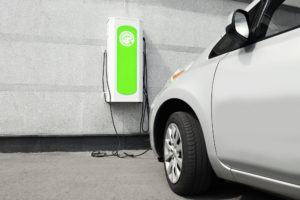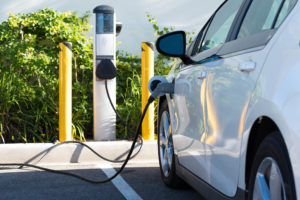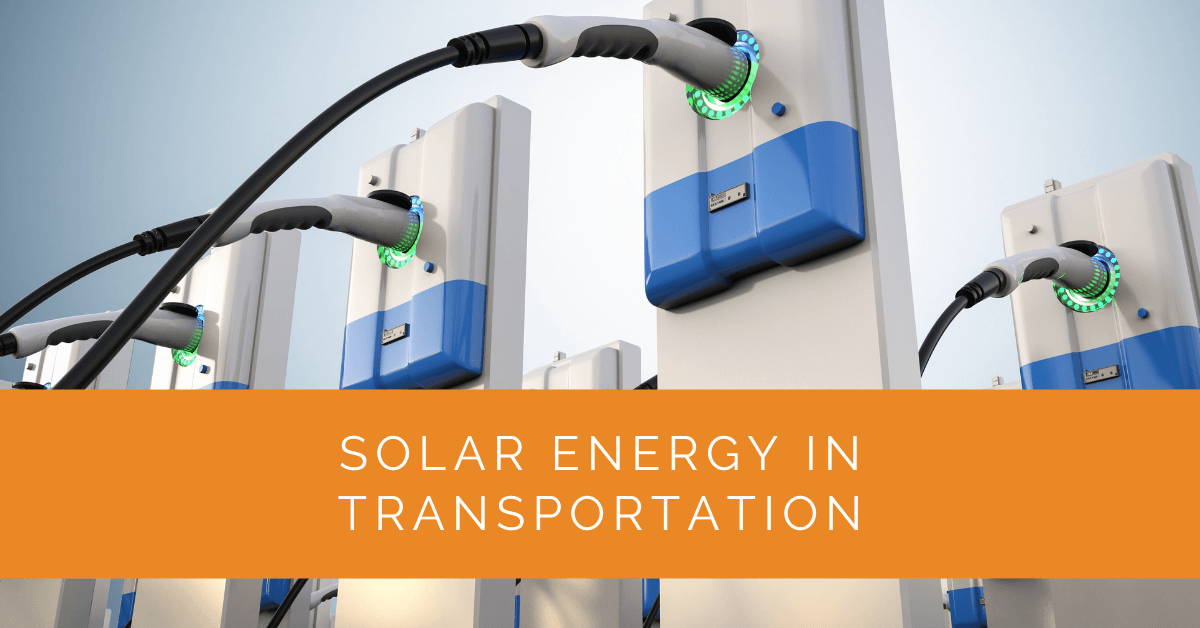Solar energy is revolutionizing transportation, offering a sustainable alternative to traditional fuel sources. By integrating solar power into various aspects of transportation, we can reduce greenhouse gas emissions, combat pollution, and pave the way for a greener future. In this article, we will explore the immense potential of solar energy in transforming public transportation, powering electric vehicles, and revolutionizing infrastructure.
Contents
- 1 Key Takeaways
- 2 Solar-Powered Public Transportation: Harnessing Solar Energy for Sustainable Mobility
- 3 Solar-Powered Cars: Driving Towards a Sustainable Future
- 4 Solar Energy Storage for Transportation: Powering Mobility Anytime, Anywhere
- 5 Solar-Powered Infrastructure: Illuminating the Way Towards a Sustainable Future
- 6 Expert Insights From Our Solar Panel Installers About Solar Energy in Transportation
- 7 Experience Solar Excellence with Us!
- 8 Conclusion
Key Takeaways
- Solar energy in transportation offers immense potential to reduce greenhouse gas emissions, combat pollution, and create a sustainable future.
- Solar-powered public transportation, such as buses and solar-powered cars supplemented with solar panels, significantly promotes cleaner and greener transportation.
- Energy storage systems and solar-powered infrastructure, including street lighting, further optimize the use of solar energy, providing reliable and efficient solutions for transportation needs while minimizing environmental impact.
Solar-Powered Public Transportation: Harnessing Solar Energy for Sustainable Mobility
In an era of rapid urbanization and increasing concern over climate change, solar-powered public transportation emerges as a promising solution to mitigate environmental impact and revolutionize how we move. By integrating solar panels into buses and other modes of public transport, we can harness the abundant power of the sun to propel vehicles and reduce our dependence on fossil fuels.
Solar Powering Public Transit: A Green Solution
Public transportation systems are the lifeblood of bustling cities, providing efficient and cost-effective mobility options for commuters. With the integration of solar panels, these systems can become even more sustainable. Solar-powered buses employ photovoltaic cells to convert sunlight into electricity, generating power to drive the vehicle’s systems and reducing reliance on conventional energy sources.
Benefits of Solar-Powered Public Transportation
Solar-powered buses offer a multitude of benefits. Firstly, they substantially reduce greenhouse gas emissions, curbing air pollution and combating climate change. Secondly, they operate more quietly compared to traditional buses, contributing to noise reduction in urban environments. Moreover, these buses present long-term economic advantages by lowering fuel costs and offering potential energy savings.
Advancements in Solar Technology for Public Transit
Advances in solar technology continue to enhance the efficiency and reliability of solar-powered public transportation. Modern solar cells can harness solar energy even under cloudy or low-light conditions, ensuring a consistent power supply throughout the day. Additionally, energy storage systems, such as high-capacity batteries, enable buses to store surplus energy generated during peak production periods, ensuring a smooth operation during reduced sunlight.

Solar-Powered Cars: Driving Towards a Sustainable Future
As the world shifts towards a greener and more sustainable future, solar-powered cars are gaining traction as a viable solution for reducing carbon emissions and promoting sustainable mobility. Equipping electric vehicles (EVs) with solar panels can harness the sun’s power to augment their energy needs and extend their range, all while minimizing our reliance on non-renewable energy sources.
Enhancing Electric Vehicles with Solar Power
Solar-powered cars combine the advantages of electric vehicles with the potential of solar energy. By integrating solar panels onto the vehicle’s roof or body, these cars capture sunlight and convert it into electricity, effectively supplementing the energy stored in the vehicle’s battery. This integration optimizes the use of renewable energy and reduces the need for external charging.
Benefits of Solar-Powered Cars
Solar-powered cars offer a range of benefits that make them an attractive option for environmentally conscious drivers. Firstly, they extend the driving range of electric vehicles by providing an additional energy source, reducing the range anxiety often associated with EVs. Secondly, they significantly reduce greenhouse gas emissions and dependency on fossil fuels, contributing to cleaner air and a healthier planet. Furthermore, solar-powered cars help individuals save on energy costs and promote a more sustainable way of commuting.
Overcoming Challenges for Widespread Adoption
While solar-powered cars hold immense potential, challenges remain to achieve widespread adoption. The limited surface area available for solar panels on a car restricts the energy generated. However, ongoing research and development efforts are focused on improving solar cell efficiency and exploring innovative solutions, such as integrating solar panels into vehicle windows or utilizing advanced materials to maximize solar energy utilization in transportation.
Solar Energy Storage for Transportation: Powering Mobility Anytime, Anywhere
Integrating efficient energy storage systems is critical in ensuring a reliable and uninterrupted power supply for solar-powered transportation. By effectively storing excess solar energy during peak production, these systems enable vehicles and infrastructure to tap into stored energy during reduced sunlight, ensuring continuous operation and optimal utilization of renewable energy.
Optimizing Energy Storage in Solar-Powered Transportation
Energy storage plays a pivotal role in maximizing the potential of solar-powered transportation. High-capacity batteries, such as lithium-ion and solid-state, are efficient storage solutions for surplus solar energy. These batteries provide a continuous power source by storing excess energy generated during peak production, even when sunlight is limited. This ensures a reliable and uninterrupted supply of energy for various transportation needs.
Advantages of Energy Storage
Energy storage systems offer several advantages in the context of solar-powered transportation. Firstly, they enhance the overall efficiency of renewable energy utilization by storing excess energy for later use. This minimizes wastage and optimizes the benefits of solar power, leading to a more sustainable and cost-effective transportation system. Secondly, energy storage enables vehicles and infrastructure to operate seamlessly, regardless of solar availability, ensuring uninterrupted mobility.
Future Developments in Energy Storage
The field of energy storage is rapidly evolving, driven by ongoing research and technological advancements. Scientists and engineers continuously strive to enhance storage capacity, improve charging efficiency, and extend the lifespan of batteries. Emerging technologies, such as solid-state batteries and hydrogen fuel cells, hold tremendous promise in revolutionizing energy storage in transportation. These advancements will further enhance the viability and efficiency of solar-powered solutions, shaping the future of sustainable mobility.

Solar-Powered Infrastructure: Illuminating the Way Towards a Sustainable Future
Beyond vehicles, solar power finds application in the realm of infrastructure development, particularly in solar-powered street lighting. By harnessing the sun’s energy to illuminate our streets, we can save electricity costs, reduce our carbon footprint, and create safer, more sustainable urban environments.
Solar Energy in Infrastructure Development
Solar-powered street lighting systems have emerged as an innovative solution to traditional grid-powered streetlights. These systems harness solar energy through photovoltaic panels during the day, storing the energy in batteries for illumination during nighttime. By leveraging renewable energy, solar streetlights provide a reliable and sustainable lighting solution that offers many advantages for urban settings.
Advantages of Solar Streetlights
Solar-powered street lighting brings numerous benefits to cities and communities. Firstly, it eliminates the need for electricity from the grid, thereby reducing reliance on fossil fuels and decreasing greenhouse gas emissions. Secondly, solar streetlights offer significant cost savings by eliminating monthly electricity bills and reducing maintenance costs associated with traditional street lighting. Additionally, they enhance safety by providing reliable lighting in areas with limited or no grid connectivity, promoting safer streets and public spaces.
Cities Benefitting from Solar-Powered Street Lighting
Cities worldwide are recognizing the advantages of solar-powered street lighting and actively implementing these sustainable solutions. Cities like Los Angeles, Barcelona, and Adelaide have embraced solar streetlights, leading sustainable infrastructure development. By adopting solar-powered lighting systems, these cities reduce their environmental impact, save energy costs, and create more livable urban environments that benefit residents and visitors alike.
Expert Insights From Our Solar Panel Installers About Solar Energy in Transportation
Integrating solar panels into public transportation systems not only reduces emissions but also significantly cuts down operational costs, making it a win-win for both the environment and the economy.
Lead Solar Installer
Solar-powered electric vehicles are revolutionizing sustainable transportation. By harnessing solar energy, we can extend the range of EVs and reduce dependency on the grid, promoting cleaner and greener mobility.
Solar Installation Specialist
Energy storage systems are the backbone of solar-powered transportation. Efficient storage solutions ensure that surplus solar energy is available whenever needed, making solar-powered transport reliable and sustainable.
Solar Energy Consultant
Experience Solar Excellence with Us!
Trust in Solar Panels Network USA, where our seasoned experts deliver top-quality solar solutions for homes and businesses nationwide. With a legacy of countless successful installations and a commitment to sustainable energy, we’re your reliable partner in the solar journey. Ready for a brighter, eco-friendly future? Call us now at (855) 427-0058 and harness the power of the sun!
Conclusion
Integrating solar energy in transportation represents a significant step towards a more sustainable and eco-friendly future. Solar-powered public transportation, electric vehicles supplemented with solar energy, optimized energy storage, and solar-powered infrastructure all contribute to reducing greenhouse gas emissions, combating pollution, and decreasing dependence on fossil fuels. We can transform the transportation sector by harnessing the sun’s power and paving the way for a cleaner, greener world.
Remember to consult this article for informative insights on solar energy, solar panels, solar-powered transportation, renewable energy, public transportation, solar power, electric vehicles, power usage, the use of solar, renewable sources, solar cells, buses, emission reduction, energy sources, fossil fuel alternatives, greenhouse gas emissions, and pollution control.
About the Author
Solar Panels Network USA stands at the forefront of solar energy solutions, driven by a team of seasoned solar engineers and energy consultants. With over decades of experience in delivering high-quality solar installations and maintenance, we are committed to promoting sustainable energy through customer-centric, tailored solutions. Our articles reflect this commitment, crafted collaboratively by experts to provide accurate, up-to-date insights into solar technology, ensuring our readers are well-informed and empowered in their solar energy decisions.

